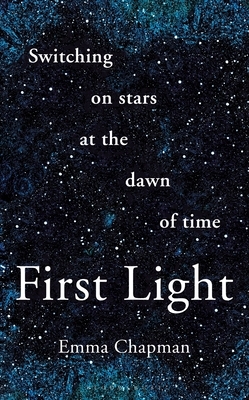
First Light: Switching on Stars at the Dawn of Time
by Emma Chapman
Genres: Non-fiction, SciencePages: 304
Rating:

Synopsis:Astronomers have successfully observed a great deal of the Universe's history, from recording the afterglow of the Big Bang to imaging thousands of galaxies, and even to visualising an actual black hole. There's a lot for astronomers to be smug about. But when it comes to understanding how the Universe began and grew up we are literally in the dark ages. In effect, we are missing the first one billion years from the timeline of the Universe.
This brief but far-reaching period in the Universe's history, known to astrophysicists as the 'Epoch of Reionisation', represents the start of the cosmos as we experience it today. The time when the very first stars burst into life, when darkness gave way to light. After hundreds of millions of years of dark, uneventful expansion, one by the one these stars suddenly came into being. This was the point at which the chaos of the Big Bang first began to yield to the order of galaxies, black holes and stars, kick-starting the pathway to planets, to comets, to moons, and to life itself.
Incorporating the very latest research into this branch of astrophysics, this book sheds light on this time of darkness, telling the story of these first stars, hundreds of times the size of the Sun and a million times brighter, lonely giants that lived fast and died young in powerful explosions that seeded the Universe with the heavy elements that we are made of. Emma Chapman tells us how these stars formed, why they were so unusual, and what they can teach us about the Universe today. She also offers a first-hand look at the immense telescopes about to come on line to peer into the past, searching for the echoes and footprints of these stars, to take this period in the Universe's history from the realm of theoretical physics towards the wonder of observational astronomy.
It turns out that I am still not great with astrophysics. Emma Chapman is enthusiastic and keen and tries to enthuse the reader, but my eyes just started to glaze over as First Light dug deeper into the detection methods, types of stars, etc, etc. There are important mysteries discussed here, stuff that it would be monumental for humanity to understand — but I won’t be the human understanding them, I’m pretty certain!
It could be that Chapman’s explanations aren’t great, but that’s hard to judge, when I know this isn’t my field or interest. There were bits I found interesting, mostly the less technical stuff, but whenever she started talking about wavelengths, I was a goner.
I will say that I did find some of her extended metaphors a bit annoying/random. I know she was trying to add colour and interest, but I didn’t need the metaphor of cooking Christmas dinner for a full family to understand that launching a complex telescope is difficult. I’d rather just hear about the telescope, thanks.
Rating: 2/5 (“it was okay”)

Too bad , the topic sounded interesting
Emma @ Words And Peace recently posted…15th blogiversary: beginnings
I think it probably is, if you have more of a head for it… sadly, it just isn’t my subject.